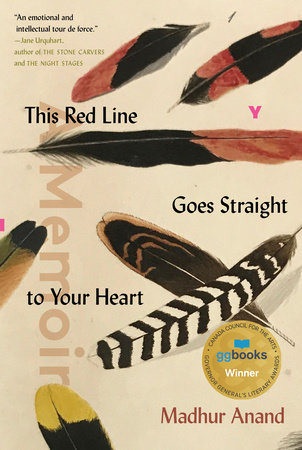Penguin Randon House Canada, Ltd., 2020, 291 pp, Paperback, U.S.$19, ISBN: 978 0 7710 4
by Arnold Zeitlin 6 September 2021
Author Madhur Anand, a professor in Canada of ecology and a published poet, has created a memoire noire, where anything positive that occurs carries it with a dark shadow. Take the example of her father. Two days after his marriage in India, he migrates to Canada, leaving behind his bride to endure an insufferable life with her new in-laws who treat her like a scullery maid. He arrives unmet in Montreal knowing no one in Canada. He opens a telephone directory, borrows a nickel, and calls the number of the first Indian name his finger touches. That Indian family collects him at the airport and puts him up with them. He leaves, telling them he has rented a room, which is a lie. With no money, he ends up sleeping on a subway bench where two Sikhs invite him to join them and three others in their one-bedroom apartment. They help get him a job in a warehouse, where he is fired because he piles boxes incorrectly and he tells his boss what does he expect for $1,75 an hour. For the first few weeks in Canada he subsisted on milk and french fries, possibly a reference to poutine, a mess of french fries, cheese, and beef gravy that Canadians jokingly call their national dish. He is also taken to a Harvey’s restaurant for a burger, his first taste as a Hindu of beef. He likes it. All of this is described in deadpan English that is occasionally hilarious, intentionally or not.
Eventually, her father finds work as a science teacher, and his wife, wearing her first pair of closed-toe shoes, joins him a year after their marriage in Canada, where she is met at the airport by her husband and 40 of his friends.
An underlining theme of the memoir is partition, stating with the independence in 1947 of India and Pakistan. Anand’s family has undivided Indian roots in Haripur, now in Pakistan’s Khyber Pukhtunkhwa province (although Anand puts it in the Punjab) and the village of Mong, now in Pakistan’s Punjab province. The book itself is an example if partition, with two front covers, on one side is the story of Anand’s parents and on the other (after the reader turns the book upside down) her story.
Her story is a series of non-chronological anecdotes, often with a dark turn, aphorisms, pithy glimpses of South Asian Indian life in Canada and how South Asian Indians contemplate life when visiting India after settling in Canada. An example of all of this is her explanation of what calls the Indian Wobble:
“Keep your shoulders still, strip your face of any expression, and tilt your head side-to-side in short arcs like a pendulum along the coronal plane that divides the body into front and back. The Indian Wobble is not a Yes, and it is not a No. It’s a Yesno. Which could be maybe, could be carry on, could be, I understand.”
That is the message of this book

